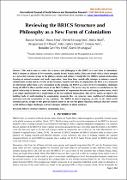| dc.description.abstract | This article aims to review the structure and philosophy of the BRICS as a new form of colonialism. BRICS denotes an alliance of five countries, namely Brazil, Russia, India, China and South Africa which emerged as a powerful economic group in the global economy and politics. Though the five BRICS summit declarations focusing on mutual economic and trade cooperation, there have been considerable attempts to enhance research collaboration. In this article, we look at the structure, features and areas of cooperation, the BRICS as a structure of collectivism rather than a new colonialism in the making, the BRICS as a new form of colonialism, challenges facing the BRICS, flaws and the future of the BRICS alliance. The review may be used as a contribution for the global scholarship to develop a more robust appreciation of cooperation between and among nation-states, which is no longer questionable but a requirement in the new political dispensation. This review makes an input to the budding body of understanding by emphasizing prospects that can generate more multifaceted relationships motivated towards communism in any continent. The BRICS is indeed inspiring, its role as the ‘third world economic power, in light of this general analysis made on the current global situation, indicates that the western world still have bigger challenges to device adequate solutions to global problems. | en_US |

